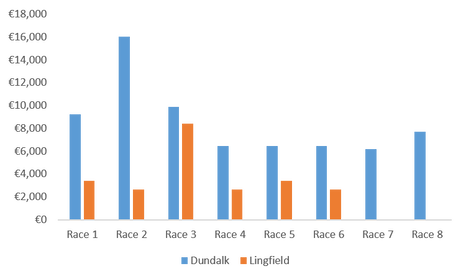In the last year or so, I have encountered a number of research papers that focus on the economics of horse racing. This culminated in (what I believe was) the first ever horse racing session at the European Sports Economics Conference at the University of Liverpool last August.
Work in the area is now developing and members of this blog, as well as colleagues in the UK at the University of Lancaster and University of Liverpool are exploring the economics of horse racing. There is really so much to explore (e.g. labour markets, betting tax, efficient markets, government support of the industry, and the impact of Brexit).
Some focus has recently turned to UK’s pending exit from the European Union and the impact on the industry, but this has been limited. The scale of a hard Brexit, which is now becoming more likely by each passing day, has the potential to decimate the industry. Remember, this is an industry that only survives in Ireland thanks to generous Exchequer support each year. More than half of all public monies are then used as prize money at Irish racecourses.
I have explored the issue on prize money on a number of occasions in the past. While the biggest prize funds on offer are on the other side of the Irish Sea (see here and here) the average level of prize money across all tracks remains higher in Ireland. This is particularly obvious at lower grade racing and has encouraged English horses to travel to Ireland (see here and here).
The difference in funding may be set to grow further. Last week Arena Racing Company which owns and operates 16 racecourses in Great Britain, announced that it would be reducing prize-money by £3 million as a direct response to the British government's recent decision on Fixed Odds Betting Terminal (FOBT) stakes. Leading trainer Mark Johnston’s response to this decision was:
“The prize-money is quite ridiculous and the whole situation of Arc cutting prize-money in anticipation of a potential cut in the number of betting shops and funding due to the FOBT reduction, which is hypothetical at the moment, is out of order. It gets to a point where it’s just not viable to take a horse all the way to Lingfield for that sort of money”.
Others have responded in a similar fashion to ARC's decision. This resulted in a reduced card at Lingfield on Saturday, and one race on the card not attracting a single entry! The solution to the problem may be reduced cards in the short run, but in the long run trainers may need to look elsewhere. Independently owned Chelmsford City Racecourse is being used as an exemplar to demonstrate the type of money that should be put on offer, at lower grade races, to attract entries.
Of course, another solution is for more horses to travel from the UK to Ireland to compete. Generally, horses and labour flow one way and not the other. A glance at prize money on offer last Friday night at Dundalk (Ireland) and Lingfield (England) demonstrates the difference.
 Exchange rate as of 26/2/19 £1=€1.16
Exchange rate as of 26/2/19 £1=€1.16 The total amount of money on offer at the Irish race course was €68,350, which is some €45,000 more than the €23,039 on offer at the English track.
All things equal, this should incentivise trainers in the UK to send more horses across the Irish Sea to race at venues such as Dundalk.
However, the extent to which this may now happen will largely not be decided to prize money on offer at Irish courses, nor reduced stakes at FOBTs in the UK, but rather events in Westminster over the coming weeks.
 RSS Feed
RSS Feed